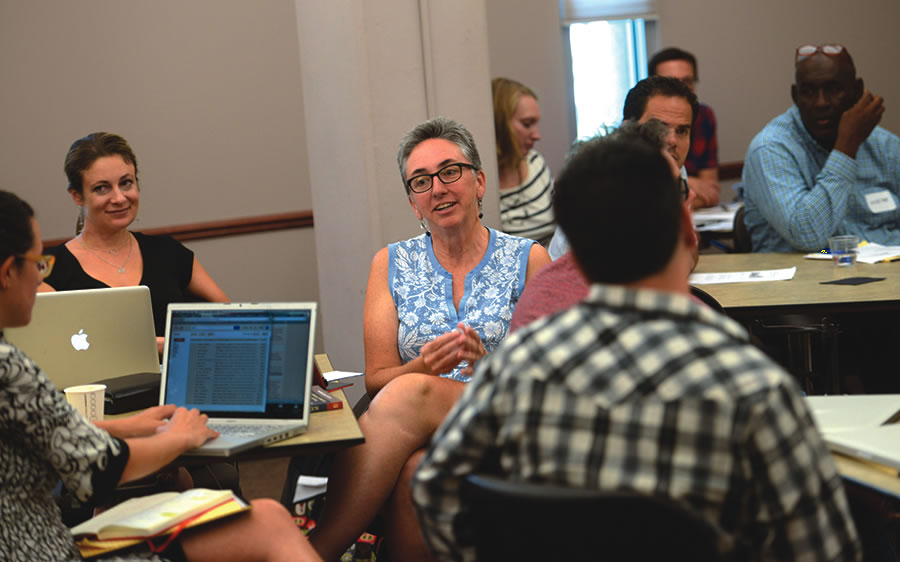When moving from one phase of life to another, what do you need to be happy and successful? Friends and a little structure to feel like you belong. Guidance on the unwritten rules of your new culture.
“What anybody needs when transitioning to a new situation is really pretty much the same,” said Anne Hyde, CC professor of history and director of the Crown Center for Faculty Development. “Whether you’re talking about new students or new faculty, they all need some of the same kinds of things to hit the ground running and succeed in their new environment.”
The New Faculty Boot Camp is designed to give new faculty some of these benefits and more. Hyde initiated and has organized the event on campus the past two summers. It supports the initiatives of recruiting and retaining excellent faculty as outlined in the strategic plan.
This summer’s boot camp took place during four days in early August and had 28 new faculty participants, including 12 tenure-track professors, several teaching post-docs, and a one-year faculty member. About 15 current faculty members participated as mentors or presenters.
The current faculty panels lead discussions on topics such as what to do the first day of class and how to manage your scholarly life. A student panel talked about what they hope CC professors will be. The heart of the boot camp is when new and existing faculty team up to workshop their course syllabi.
“We held the boot camp in early August so people have time to revise their syllabi before classes start. The timing worked out great,” Hyde said.
She outlined the boot camp’s three main goals:
- “We want to give new faculty a really strong cohort, to start out with a group of friends they can bond with and move through their different phases of development with here. It really is the same goal you have for a beginning student in a lot of ways,” she said.
- Secondly, the boot camp helps new faculty figure out best practices specific to CC and the huge range of what they can do while teaching on the Block Plan.
“No one has had experience teaching on the Block Plan when they arrive. We team up experienced faculty with new faculty and they convey the huge range of stuff you can do. New faculty are amazed that when we say ‘you can do field work’ we really mean it! They begin to realize, ‘Wow, I really can take my class to xyz, locally, to Denver, internationally, for a week, a block, a day. That’s great!” Hyde said.Conversely, new faculty are a little daunted when another reality of teaching a course on the Block Plan hits them.“It’s the shock of the 18 days. ‘I really have to put everything into 18 days?’ But we give them guidance about how to do that so they are more prepared,” Hyde said. - The third goal is to help new faculty get off on the right foot with their students.“CC students have really high expectations. They’re eager and sometimes impatient. We want to make sure faculty know what to expect and know how to meet the challenge,” Hyde said.
After the summer boot camp, new faculty members are invited to meet every first Friday in later blocks. They have lunch together and socialize, share experiences, and ask questions.
Becca Barnes, assistant professor in the Environmental Program, said she thought the New Faculty Boot Camp was incredibly helpful, especially to those who have never taught on the block before.
“Plus we got to meet our new colleagues, which is always nice when you are new yourself,” Barnes said.
“I thought the most helpful thing was working with more senior faculty members on our syllabi. I completely changed my syllabus from what I had during that four-day period; my mentor helped me re-think how to organize a class within a block framework. His suggestions (and the other faculty members’ suggestions) were extremely helpful. In addition, I really appreciated the bits of advice I received from faculty that I probably wouldn’t have met if they hadn’t been brought together for the event.”
Another new faculty member, Elizabeth Coggins, assistant professor of political science, said she also learned a lot.
“The Faculty Boot Camp was incredibly useful. Not only did it provide the opportunity to connect with other first-year faculty of CC, but it also exposed us to many other faculty and staff members in various roles throughout the college (e.g., the president came to breakfast, we had lunch with the deans). I have many other friends starting first-year jobs across the country, and not one of them had a similar opportunity; they were essentially assigned an office and a classroom for the first day! I can’t imagine,” Coggins said.
“The Boot Camp was also very well organized. Each session seemed carefully planned with a specific purpose. We did multiple tangible activities (e.g., syllabus design), but we also had hours of one-on-one help from current faculty members. This was probably the most useful experience: one-on-one time with a current and experienced CC faculty member at one’s disposal in the weeks leading up to teaching on the block schedule!”
Hyde said she hopes to continue the New Faculty Boot Camp for summers to come.
“It was fun! Really fun! Watching their energy and getting to know each other. They seemed to feel completely energized after boot camp, imagining all the cool things that can happen at CC,” Hyde said.
